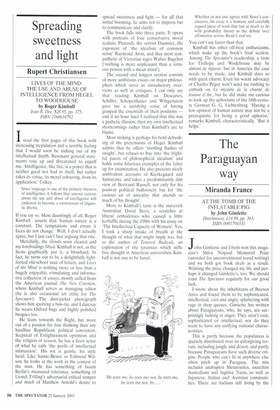Spreading sweetness and light
Rupert Christiansen
LIVES OF THE MIND: THE USE AND ABUSE OF INTELLIGENCE FROM HEGEL TO WOODHOUSE by Roger Kimball Ivan R. Dee, $28.95, pp. 375, ISBN 1566634792 Iread the first pages of this book with increasing trepidation and a terrible feeling that I would soon be sinking out of my intellectual depth. Resonant general statements rose up and threatened to engulf me. 'Intelligence, like fire, is a power that is neither good not bad in itself, but rather takes its virtue, its moral colouring, from its application.' Crikey.
Since language is one of the primary theaters of intelligence, it follows that anyone curious about the use and abuse of intelligence will endeavor to become a connoisseur of linguistic drama,
If you say so. Most dauntingly of all, Roger Kimball asserts that 'human nature is a constant. The temptations and errors it faces do not change.' Well, I don't actually agree, but I just can't face arguing that one.
Mercifully, the clouds soon cleared and my forebodings lifted. Kimball is not, as the Scots graphically put it, a blowhard. In fact, he turns out to be a delightfully lightfooted old-school man of letters, and Lives of the Mind is nothing more or less than a hugely enjoyable, stimulating and informative collection of essays, mostly culled from the American journal The New Criterion, where Kimball serves as managing editor (he is also occasional art critic for The Spectator). The dust-jacket photograph shows him sporting a bow-tie, and I daresay he wears Oxford bags and highly polished brogues too.
He leans towards the Right, but more out of a passion for free thinking than any hardline Republican political conviction. Sceptical of Enlightenment optimism and the religion of reason, he has a keen sense of what he calls 'the perils of intellectual infatuation'. His wit is gentle, his style lucid. Like Sainte-Beuve or Edmund Wilson, he looks at the work in the context of the man. He has something of Isaiah Berlin's measured tolerance, something of Lionel Trilling's adversarial critical temper and much of Matthew Arnold's desire to spread sweetness and light — for all that initial booming, he aims not to impress but to communicate and clarify.
The book falls into three parts. It opens with portraits of four conservative moral realists: Plutarch, the satirist Daumier, the exponent of 'the idealism of common sense' Raymond Aron, and that most sympathetic of Victorian sages Walter Bagehot ('nothing is more unpleasant than a virtuous person with a mean mind.).
The second and longest section consists of more ambitious essays on major philosophers which serve as introductory overviews as well as critiques. I can only say that reading Kimball on Descartes. Schiller, Schopenhauer and Wittgenstein gave me a satisfying sense of having grasped the essentials of their positions — and if an hour later I realised that this was a pathetic illusion, then my own intellectual shortcomings rather than Kimball's are to blame.
Most striking is perhaps his bold debunking of the pretensions of Hegel. Kimball admits that he offers 'startling flashes of insight', but refuses to buy into 'the frightful patois of philosophical idealism' and holds some hilarious examples of the latter up for examination. He also presents nicely ambivalent accounts of Kierkegaard and Santayana, and takes a predominantly dim view of Bertrand Russell, not only for his postwar political buffoonery but for 'the curious air of unreality that attends so much of his thought'.
More to Kimball's taste is the maverick Australian David Stove, a scratcher at liberal orthodoxies who caused a little kerfuffle during the 1980s with his essay on 'The Intellectual Capacity of Women'. Yes, I took a sharp intake of breath at the thought of what that might imply too, but as the author of Tenured Radicals, an exploration of the tyrannies which stifle free thought in American universities, Kimball is not one to be fazed.
Whether or not one agrees with Stove's conclusions, his essay is a humane and carefully argued piece of work that has as much to do with probability theory as the debate over affirmative action. Read it and see.
You can't say fairer than that.
Kimball has other off-beat enthusiasms, which make up the book's final section. Among The Spectator's readership, a taste for Trollope and Wodehouse may be almost de rigueur, but in America the case needs to be made, and Kimball does so with great charm. Even his warm advocacy of Charles Peguy won't send me rushing to embark on Le mystere de la chtuite de Jeanne d'Arc, but he did make me curious to look up the aphorisms of the 18th-century German G. G. Lichtenberg. 'Having a low opinion of human nature may not be a prerequisite for being a good aphorist,' remarks Kimball, characteristically. 'But it helps.'


















































































 Previous page
Previous page